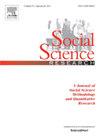Flexible work arrangements, gender ideology, and housework time among dual-earner couples
IF 3.5
2区 社会学
Q1 SOCIOLOGY
引用次数: 0
Abstract
The potential of flexible work arrangements (FWAs) to reduce gender disparities in domestic labor has been a topic of considerable debate. Scholars posit that the extent of this equalizing impact hinges on how couples, when employing FWAs, allocate their time between work and family domains based on their prevailing gender ideologies. Analyzing longitudinal couple-level dyadic data in the United Kingdom and using the actor-partner interdependence model, this study contributes to the debate by investigating how the relationship between the use of FWAs and housework time among couples depends on the combination of their gender ideologies. The results reveal that a wife's adoption of FWAs notably amplifies her housework responsibilities and diminishes her husband's, when at least one spouse in a couple holds a traditional gender ideology. In contrast, a husband's use of FWAs boosts his own housework hours, only when both spouses have a more egalitarian gender ideology. However, a husband's use of FWAs does not reduce his wife's housework duration regardless of couple's gender ideology. Notably, it is couple's gender ideology, rather than FWAs usage, that has greater predicting power in housework time especially for the wife. Overall, these results underscore the necessity of contextualizing the effects of FWAs through the lens of prevailing gender ideology within couples to understand their influence on gender disparities in domestic labor.
双职工夫妇的灵活工作安排、性别意识形态和家务劳动时间
灵活工作安排在减少家务劳动中的性别差异方面的潜力一直是一个颇有争议的话题。学者们认为,这种平衡影响的程度取决于夫妇在雇用FWAs时,如何根据他们普遍的性别意识形态在工作和家庭领域之间分配时间。本研究分析了英国纵向夫妻双元数据,并使用行为者-伴侣相互依赖模型,通过调查夫妻中使用FWAs和家务时间之间的关系如何取决于其性别意识形态的组合,为争论做出了贡献。结果表明,当夫妻中至少有一方持有传统的性别意识形态时,妻子采用FWAs显著地增加了她的家务责任,减少了她丈夫的家务责任。相反,只有当夫妻双方都有更平等的性别意识形态时,丈夫使用FWAs才会增加自己做家务的时间。然而,无论夫妻的性别意识形态如何,丈夫使用FWAs并不会减少妻子的家务劳动时间。值得注意的是,夫妻的性别意识形态,而不是FWAs的使用,对家务劳动时间的预测力更大,尤其是对妻子。总的来说,这些结果强调有必要通过夫妻中普遍存在的性别意识形态来将家庭主妇的影响置于背景中,以了解其对家务劳动中性别差异的影响。
本文章由计算机程序翻译,如有差异,请以英文原文为准。
求助全文
约1分钟内获得全文
求助全文
来源期刊

Social Science Research
SOCIOLOGY-
CiteScore
4.30
自引率
4.00%
发文量
0
审稿时长
65 days
期刊介绍:
Social Science Research publishes papers devoted to quantitative social science research and methodology. The journal features articles that illustrate the use of quantitative methods in the empirical solution of substantive problems, and emphasizes those concerned with issues or methods that cut across traditional disciplinary lines. Special attention is given to methods that have been used by only one particular social science discipline, but that may have application to a broader range of areas.
 求助内容:
求助内容: 应助结果提醒方式:
应助结果提醒方式:


